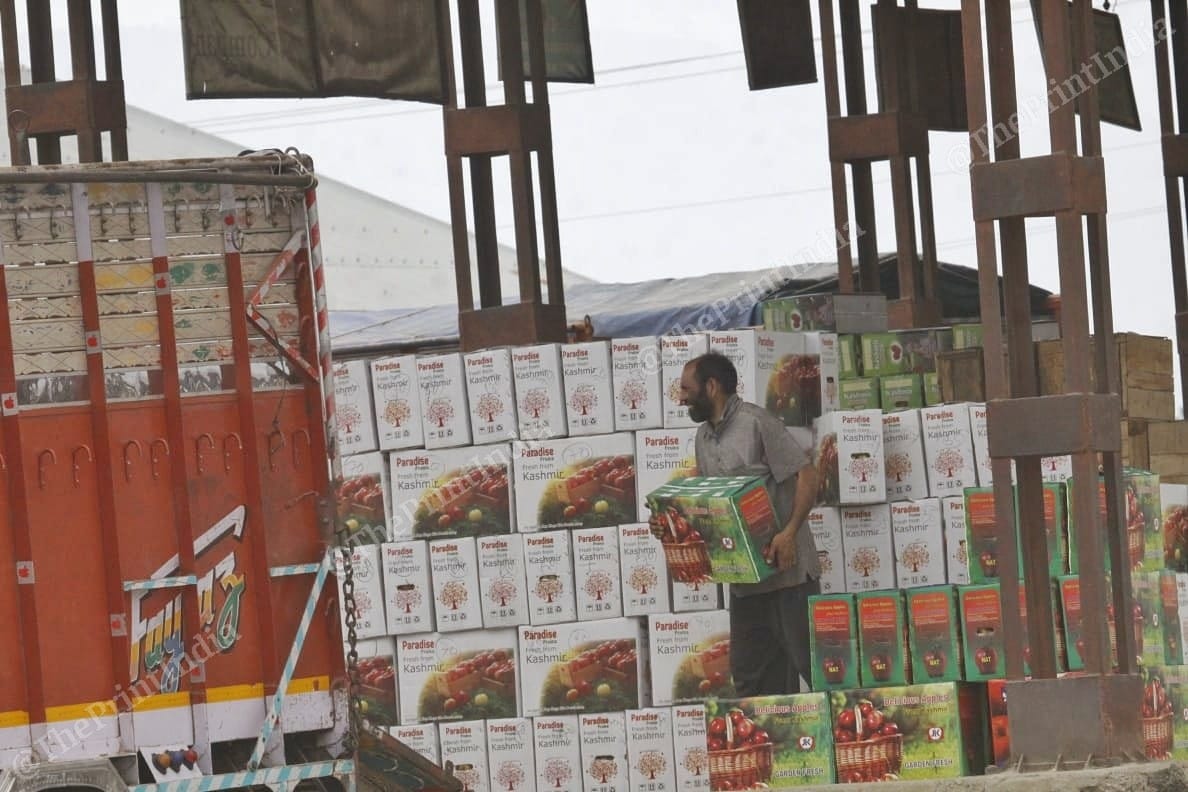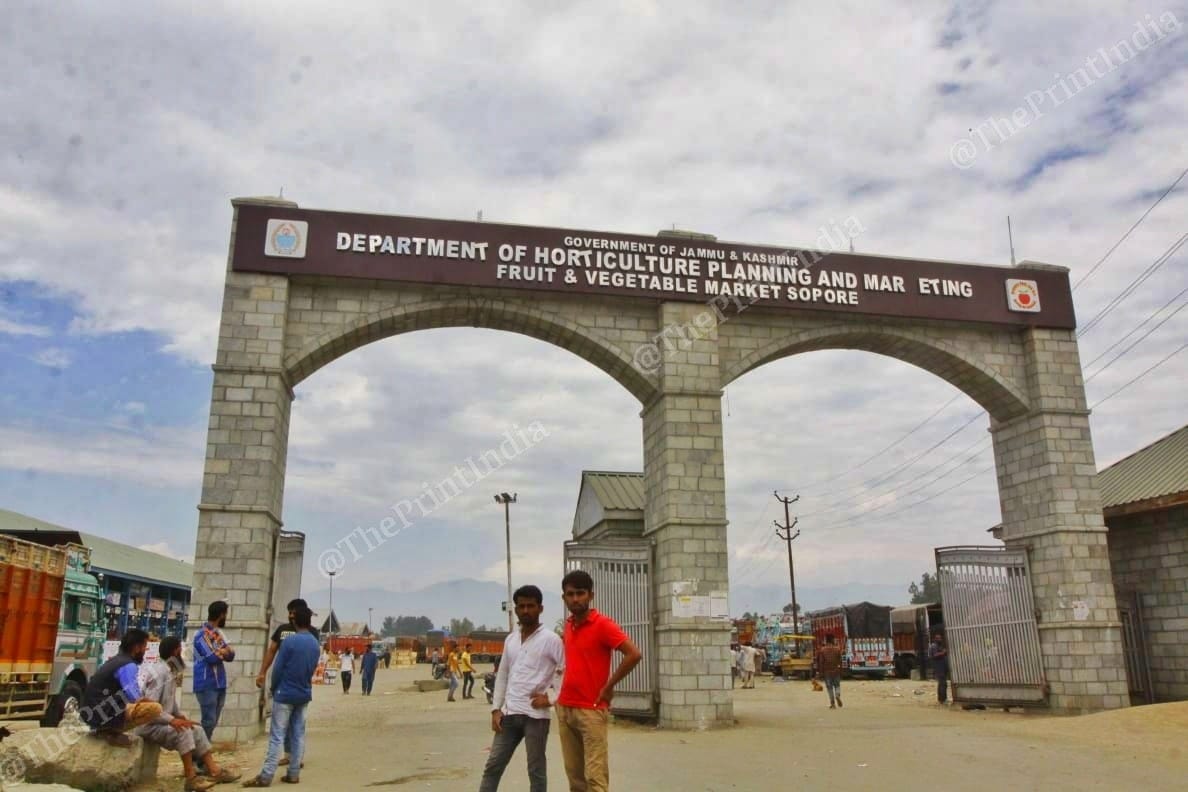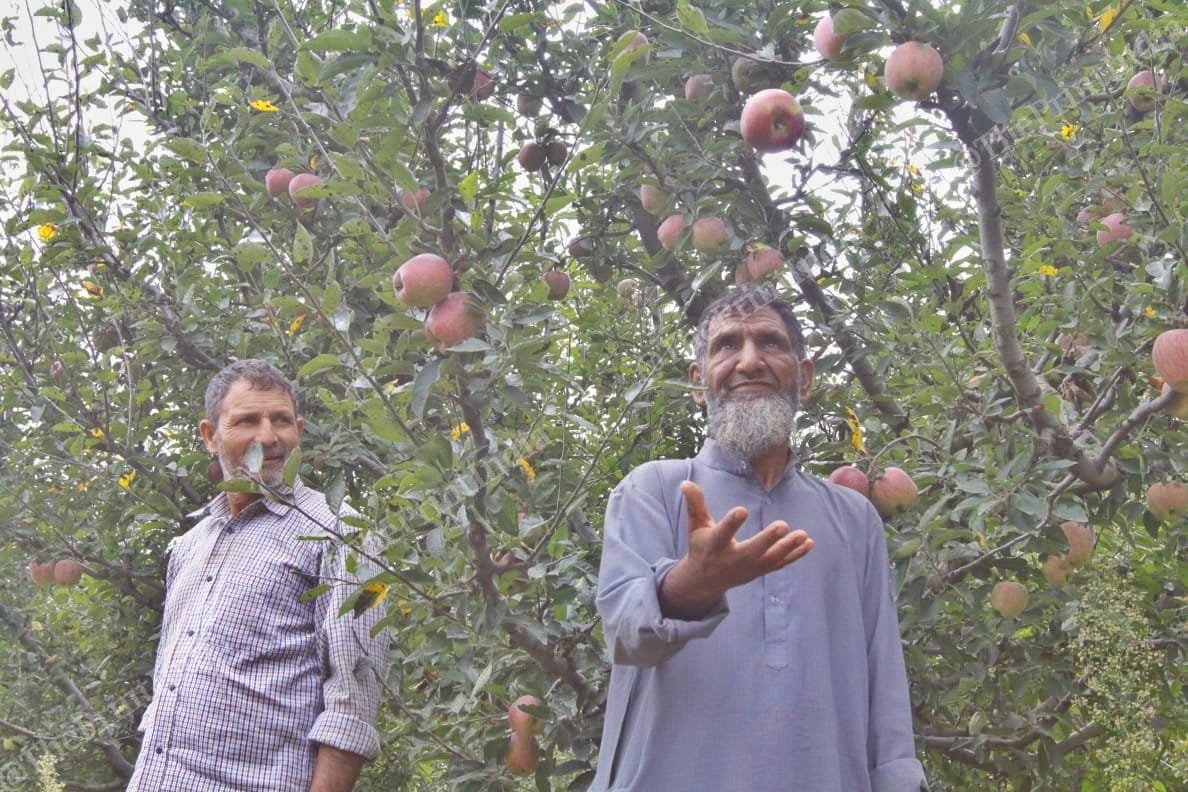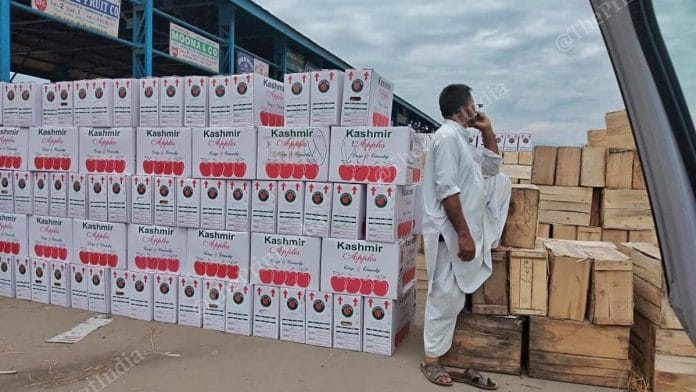Sopore: Tareeq has been sitting idle for the last ten days. Usually, he makes Rs 500-600 every day packing and loading apples in trucks at the local market. But over the last week, he hasn’t made even Rs 50.
It’s not just Tareeq. The apple produce that has managed to reach the Sopore mandi, too, is rotting, packed in boxes.
The Jammu and Kashmir government has claimed that 300 trucks are engaged in taking the fruit produce from mandis across Kashmir to markets within and outside the state after restrictions were lifted from most parts of J&K.
But according to Tareeq, no more than 30-40 trucks have left the Sopore market in the last month — after the Narendra Modi government abrogated Article 370 and clamped down on the state.
The reason? Labourers say they are caught between civil curfew and police clampdown.
According to the labourers, if they work in the morning, the local residents who have imposed a civil curfew in the area get agitated. And the police and paramilitary forces don’t allow them to work at night.
Over 6,000 labourers like Tareeq work two shifts in north Kashmir’s Sopore market — Asia’s second largest fruit market that currently wears a deserted look. While some are engaged in packing apples in wooden boxes and paper cartons, others are tasked with loading them in trucks.
‘We are stuck’
A labourer who did not wish to be identified, fearing backlash from the residents and arrest by the police for speaking up, told ThePrint, “We are stuck from both ends. In the morning we cannot operate because there is a civil curfew. If we work, we will be beaten by locals for not standing for the cause of Kashmir.”
“And if we work at night, the police and the force comes and thrashes us. They insist that we work in the morning,” said the labourer.
He added, “The police want to show that everything is normal and work is going on as usual, which is why they want us to work in the morning. The locals want to show their protest by keeping the shops and mandis shut. We are suffering in between.”
A second labourer, who packs apple cartons, told ThePrint that there is pressure from militants as well. Some pamphlets were distributed in the area nearly 10 days ago stating that no one shall go to work or open their shops in the morning. If anyone has to work, they should do it after the sun sets, he claimed.

The message, other labourers added, was also communicated verbally to them.
On Saturday, a couple and their 2-year-old daughter sustained injuries after they were allegedly shot at by militants. The man has an apple orchard, according to the police.
“Who will take the risk to send their produce to the mandi? Also, even if someone sends it, who will load it in trucks and take it to the markets? No one wants to get killed. Today, the militants have just given a warning by shooting them in the leg. Tomorrow, the shot will be in the head,” said the second labourer.
“We too are Kashmiris and we are for the cause, but our families are going hungry and we have to do some work at least to feed them. But what do we do? We will get killed by militants for working in the morning and by the police and forces for working in the night. Moreover, we will be boycotted by our men (locals) for not complying with the calls for hartal (strike),” he added.
Also read: Kashmir clampdown is driving up apple prices, you could soon be paying Rs 200-250/kg
Farmers refuse to send their produce
The apple trade is a significant contributor to Jammu and Kashmir’s economy.
According to Ajaz Ahmad Bhatt, Director, Horticulture Kashmir, the apple industry in the state has a turnover of Rs 10,000 crore, and provides employment to over 7 lakh families.

Due to good weather conditions, the produce this year has been 20 per cent higher compared to a year ago but most of it has been lying either in markets or farmers’ warehouses.
Bhatt claimed that farmers have been sending their produce, and it has been reaching markets despite restrictions on movement of trucks in some areas. But Mohammad Sultan, who owns orchards in Patan and Sopore, said he has incurred losses to the tune of lakhs.
“Most of our produce is lying here at the orchard or at our homes. There is no way to even send it to cold storage. They are rotting. The sales have been extremely poor as nothing is reaching the mandi,” Sultan said.
In Kashmir, September is the peak season for fruits, with several varieties of apples reaching the market. Delicious and American variety of apples hit the markets towards the end of the month. Galamas is produced in July-August, and Maharaji — the last variety to reach the market — arrives at the beginning of October.
The farming of the fruit begins in January and the process goes on until October-November. The orchards are then left to replenish in December.
This year, the Galamas apples that came in August, went for a waste. As a result, the farmers have now stopped plucking the fruit from their orchards.
“Currently, what you see in the orchards is the variety called Delicious. It is ready to go to the mandi but we will not pluck it. Because we know it will just rot in our homes, just like the Galamas variety that was wasted before this.”
“I am more worried about the American variety, the most expensive variety, and Maharaji that will come after this,” said Nishad Ahmad Lone, a farmer from Checksari village in Baramulla district.

“Come and see how much apple has gone waste. I have incurred losses of lakhs. There is no way to send it to the mandi also. Even if we manage that, it will rot in the mandi as it cannot be transported further,” he added.
‘Minor hiccup’
Ajaz Ahmad Bhatt agreed the tense situation in the state has impacted the sale of apples, but proceeded to call it a “minor hiccup”.
“Due to the present situation, the state took up this matter with the Centre and we have been promised that a better price than the average market will be given to our farmers so that they can recover their losses,” he said.
He added that the J&K government’s chief secretary has taken up the matter with the Narendra Modi government, and a team from the National Agricultural Cooperative Marketing Federation of India (NAFED) has been sent to purchase over 10 lakh metric tonnes of apple from Kashmir at a good price.
“We are making efforts to ensure that apple farmers, who have a major contribution to our economy, do not have to suffer. Meetings are on with the Centre and NAFED is in the process of establishing an office here. We have also submitted a cabinet note for approval requesting purchase of these apples at a higher price,” he said.
“They (NAFED) will purchase the produce and make instant payments.”
A committee of the state government will decide the per-metric-tonne purchase rate depending upon the quality of the produce of the apples, according to a source.
Also read: Truckers stuck at Kashmir’s Sopore fruit mandi with nowhere to go & nothing to do







Happy to read that NAFED will step in and procure the fruit directly from farmers. This decision could have been taken earlier. In fact, it could, with a little foresight, have been programmed into the initial constitution change exercise. When decisions of such magnitude are taken within a small circle, important aspects can be overlooked. Anyone dealing with demons could have suggested that adequate quantities of new currency could be printed in advance.
… demonetisation …
Chaman ujad gaya.